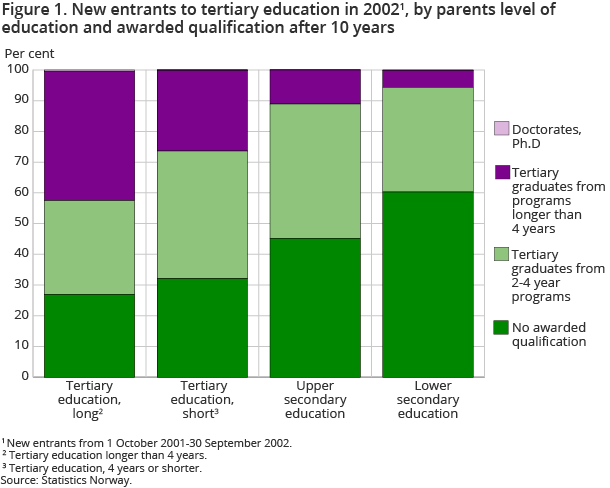Content
Published:
This is an archived release.
Many not completing degrees
Forty-two per cent of new students who began a tertiary education in the school year 2001/2002 did not complete their degree within 10 years. The share for men was 48 per cent, and for women 37 per cent.
| Total | Males | Females | |
|---|---|---|---|
| 1Students who enrolled in tertiary education for the first time from 1.10.yyyy-1 to 30.09.yyyy. (Example. the year of start 1999, will be started the period 1.10.1998-30.9.1999) | |||
| 20021 | |||
| Total | 42 318 | 17 827 | 24 491 |
| Doctorates, Ph.D | 212 | 139 | 73 |
| Tertiary graduates from programmes longer than 4 years | 8 228 | 3 930 | 4 298 |
| Tertiary graduates from programmes lasting 2-4 years | 16 316 | 5 149 | 11 167 |
| No awarded qualification | 17 562 | 8 609 | 8 953 |
| Per cent | |||
| Total | 100.0 | 100.0 | 100.0 |
| Doctorates, Ph.D | 0.5 | 0.8 | 0.3 |
| Tertiary graduates from programmes longer than 4 years | 19.4 | 22.0 | 17.5 |
| Tertiary graduates from programmes lasting 2-4 years | 38.6 | 28.9 | 45.6 |
| No awarded qualification | 41.5 | 48.3 | 36.6 |

Of the approximately 42 300 new students who enrolled in tertiary education in autumn 2002, 42 per cent did not complete a degree within 10 years . Compared with the students who started 10 years earlier, this is an increase of 9 percentage points. Male students continue to have the highest drop-out rate. In the 2002 cohort, almost half of the male students did not complete a degree within 10 ten years. The corresponding figure for women was 37 per cent.
Parents’ education counts
Students whose parents’ highest level of education is lower secondary make up the largest share of students who do not complete their degree. The higher the education that one of the parents has, the more likely it is that a student will complete a degree within ten years. Of the new students in 2002 whose parents had a long tertiary education, 73 per cent had earned a degree after 10 years. By comparison, the corresponding share for students whose parents had only a lower secondary education was 40 per cent. The share who completed a degree among students whose parents had a tertiary education is virtually unchanged between the cohorts from 1992 and 2002, while for students with parents with a lower secondary education, the figure has fallen from 65 to 40 per cent. There are major disparities among students on degree programmes lasting more than four years. Forty-three per cent of the students whose parents had a long tertiary education completed a degree programme lasting more than four years. The corresponding share for students whose parents only had a lower secondary education was 6 per cent.
Nearly a quarter of all bachelor students drop out
Around 31 000 students enrolled on a bachelor’s degree programme for the first time in 2008, and 47 per cent of these completed their studies within three years. After a further two years, 64 per cent had completed their degree. This is an increase of 2 percentage points compared with the students who enrolled in 2007. During this five-year period, 20 per cent dropped out, and 6 per cent of these dropped out after the first year. The bachelor degree in economics and administration subjects had the highest share of students who dropped out within five years, with 32 per cent. Sixty-eight per cent of the women completed their bachelor education within five years, and the corresponding figure for men was 57 per cent.
No change in number of engineering students attaining a degree
In autumn 2008, more than 3 000 students enrolled on engineering studies for the first time. Fifty-two per cent of these completed a degree within three years. After a further two years, 65 per cent had completed their studies. Compared with students who enrolled in 2007, there was no change, with one in every five engineering students dropping out during the five-year period.
Increase in numbers completing teaching education
Of the students who enrolled in the general teacher training programme in 2007, 63 per cent had completed their course within six years. For those who enrolled three years earlier, in 2004, the completion rate was 56 per cent. The share of male students completing their course increased from 45 to 53 per cent, and the women saw an increase from 61 to 67 per cent.
3 out of 10 men did not complete their nursing education
Among the cohort who enrolled in nursing programmes in 2008, 3 out of 10 men did not complete their studies within five years. The corresponding share for women was 2 out of 10.
Higher completion rate for women than for men in pre-school teacher training
Of those who enrolled in pre-school techer training in 2008, 3 out of 4 completed their studies after five years. The gender gap here is considerable, with a completion rate of 75 per cent for women and 55 per cent for men.
Contact
-
Jane Bekkengen
E-mail: jane.hansine.bekkengen@ssb.no
tel.: (+47) 40 81 13 52
-
Geir Nygård
E-mail: geir.nygard@ssb.no
tel.: (+47) 48 15 13 44
-
Nawid Fazli
E-mail: nawid.fazli@ssb.no
tel.: (+47) 97 09 77 18
